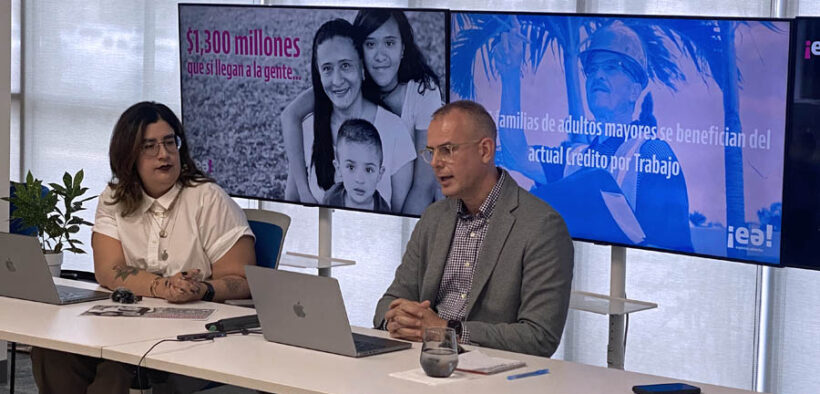Puerto Rico EITC cuts could hit retirees, young adults, report warns

Espacios Abiertos warns $400 million reduction may undermine labor force incentives.
A new report by watchdog group Espacios Abiertos warns that proposed changes to Puerto Rico’s Earned Income Tax Credit (EITC) by the Financial Oversight and Management Board (FOMB) could disproportionately harm vulnerable groups, including retirees, young adults and households without dependents.
In its latest certified fiscal plan, the FOMB suggested that the government consider adjusting the eligibility criteria to reduce the program’s cost, which reached $1.3 billion for tax year 2023, according to the most recent available data. Based on official data from the Puerto Rico Treasury Department, EA’s study reveals the negative consequences such a measure would have if approved.
“In an economic context where Puerto Rico is experiencing a clear slowdown and where key sectors like construction are struggling to find workers, cutting the EITC will discourage participation in the formal economy and hinder our economic growth,” said Daniel Santamaría-Ots, co-executive director of EA.
“In an environment where federal funds are decreasing, adding local austerity through EITC cuts could not only cause our labor force participation rate to drop again, but also force local businesses to absorb much of the reduction if they want to maintain the current incentives for formal employment and prevent part of their workforce from returning to the informal sector,” he added.
The EITC was approved to directly favor low- and moderate-income families in order to stimulate the economy. This credit is proven to reduce poverty, incentivize work and increase the formal workforce.
The EITC program disbursed $1.3 billion and granted an average credit of $1,873 to 695,689 families in tax year 2023. This work incentive also enabled more than 64,000 Puerto Rican families to improve their economic security by crossing the federal poverty threshold.
Among the affected populations, the study highlights: 86,735 retiree households that received an average of $1,208; 127,399 young adults between 19 and 26 years old who received an average of $1,503; and 494,458 households without dependents who received an average of $1,145, according to official Treasury data accessed by EA.
Under the FOMB plan, the EITC budget could be reduced by up to $400 million, bringing it down to $900 million. Even if the program grows to $1.4 billion next year as projected, this would still cap funding at approximately $1 billion. EA warned that such cuts could reverse gains in labor force participation, which has increased 3.9 percentage points since the program’s implementation in 2018.
In contrast, the report points to Puerto Rico’s Act 22 (under Act 60 of Puerto Rico’s Tax Incentive Code) tax breaks for wealthy investors, which will cost an estimated $683 million in 2026. A recent legislative proposal to tax passive income from Act 22 beneficiaries at 4% — up from 0% — could generate between $27.8 million and $60.6 million annually starting in 2027, and up to $271 million annually if extended beyond 2037.
“A responsible tax reform should not only ask how much it costs to close the deficit, but also who will pay for it. We cannot justify a cut of up to $400 million to the EITC while leaving $271 million in uncollected revenue from Act 22 beneficiaries on the table,” Santamaría-Ots added.
To promote fiscal fairness and transparency, EA recommends:
- Fiscal transparency: The Treasury Department should resume publishing the tax expenditures report, which it has not released since last year.
- Public tax simulation platform: Promote the publication in open data format of the tax microsimulation tool developed by the Treasury and funded by OPAL in 2022, which remains inaccessible to the public.
- Fair tax reform: The Legislative Assembly must design tax proposals that offset fiscally regressive measures such as a potential $400 million cut to the EITC.
“Any tax reform proposal in Puerto Rico must balance economic growth, social protection and fiscal responsibility. We cannot continue to burden our working class and small businesses while maintaining tax shields for large multinationals and high-income earners. Fiscal equity is not optional — it is a prerequisite for the country’s economic sustainability,” Santamaría-Ots concluded.
To raise awareness, EA has updated its digital map tool, allowing users to explore how EITC cuts could affect municipalities. Among the most affected areas are:
- San Juan: up to $31.9 million
- Bayamón: $20 million
- Ponce: $17.6 million
- Carolina: $16.3 million
- Caguas: $13.6 million
- Arecibo: $10.1 million
- Toa Baja: $8.4 million
- Mayagüez: $8.3 million
- Toa Alta: $7 million
- Guaynabo: $6.9 million











